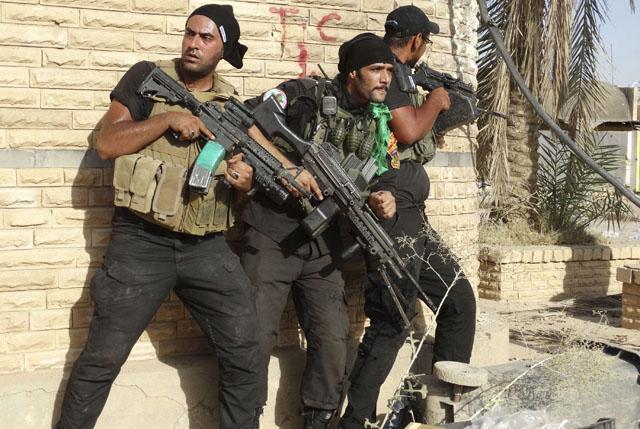You are here
Iraqi cleric urges Maliki’s bloc to choose new PM
By Reuters - Jul 07,2014 - Last updated at Jul 07,2014

BAGHDAD — Iraqi Prime Minister Nouri Al Maliki’s coalition should withdraw its support for his bid for a third term and pick another candidate, Shiite Muslim cleric Moqtada Al Sadr urged, amid parliamentary deadlock over the formation of a new government.
Maliki has come under mounting pressure since Islamic State militants took swathes of the north and west of Iraq last month and declared a caliphate on land they and other Sunni armed groups have captured in Iraq and Syria.
In a statement published on his website late on Saturday, Sadr said Maliki “has involved himself and us in long security quarrels and big political crises” and suggested that preventing Maliki from serving a third term would be a “welcome step”.
“It is necessary to demonstrate the national and paternal spirit by aiming for a higher, wider goal from individuals and blocs and by that I mean changing the candidates,” said Sadr, who gained political influence during the US occupation.
The radical cleric and his political allies had previously advocated the next prime minister should be a Shiite chosen from outside of Maliki’s State of Law coalition.
“I remain convinced that the brothers in the State of Law coalition must present the candidate for prime minister ... because it is the biggest bloc within the National Alliance,” Sadr said.
State of Law is part of the National Alliance, a bloc comprising the country’s biggest Shiite parties, including both Maliki’s list and his foes.
Dhiya Al Asadi, secretary general of the Al Ahrar bloc, the Shiite political party loyal to Sadr, told Reuters: “We are fine with any State of Law candidate as long as he is not Maliki.”
The United States, Iran, the United Nations and Iraq’s own Shiite clerics have called on Iraqi politicians to overcome their differences to face the insurgency.
Analysing video
Maliki’s military spokesman Qassim Atta told reporters on Sunday “the security apparatus is working” to analyse a video posted online of a man purporting to be the leader of Islamic State praying at the Grand Mosque in Mosul.
The city is one of those seized by the Islamic State of Iraq and the Levant (ISIL) last month before the group changed its name and declared its leader Abu Bakr Al Baghdadi caliph, a title held by successors of the Prophet Mohammad.
Interior ministry spokesman Saad Maan had earlier said the 21-minute video, which carried Friday’s date, was “false”.
Atta said the video was being “cross-referenced with intelligence data to determine whether it is in fact” the reclusive Baghdadi.
Before the video was released on jihadist forums and Twitter accounts associated with the group, reports appeared on social media that Baghdadi would make his first public appearance.
Government forces were on Sunday continuing to battle Islamic State militants south of the rebel-held city of Tikrit, which the army has yet to retake after an offensive began on June 28, Atta said.
He said forces had killed 14 militants since Saturday in Al Dayoum and Wadi Shisheen areas near Tikrit and troops were reinforcing the village of Awja, recaptured three days ago, and preparing to push 8km north into the city.
Maliki’s opponents blame his divisive rule for fuelling the political crisis and want him to step aside. They accuse him of ruling for the Shiite majority at the expense of the Sunni and Kurdish minorities.
He has remained defiant, insisting on Friday that he will not give up his quest for a third term in power.
The first meeting of the Iraqi parliament since its election in April collapsed last week without agreement. Kurds and Sunnis walked out, complaining Shiite lawmakers had not yet determined who they would put forward as premier.
Maliki’s main Shiite rivals say there is consensus among some in the Shiite coalition and among the Sunnis and Kurds against his bid for a third term.
“There is a wish by all political blocs except the State of Law ... [for] the change,” said Ali Shubber, a leading member of the Islamic Supreme Council of Iraq (ISCI), a Shiite party that came second to Maliki’s State of Law in April’s election.
“We feel that it must take place in order to change the political equation.”
Another Shiite politician, former prime minister Iyad Allawi, called on Maliki on Saturday to give up his bid for a third term or risk the dismemberment of Iraq.
Related Articles
Iraqi government forces backed by helicopter gunships began an offensive on Saturday to retake the northern city of Tikrit from Sunni Islamist militants while party leaders pursued talks that could end Prime Minister Nouri Al Maliki’s divisive rule.
Regional power broker Iran believes Iraqi Prime Minister Nouri Al Maliki is no longer able to hold his country together and is looking for an alternative leader to combat a Sunni Islamist insurgency, senior Iranian officials said on Tuesday.
Regional power broker Iran believes Iraqi Prime Minister Nouri Al Maliki is no longer able to hold his country together and is looking for an alternative leader to combat a Sunni Islamist insurgency, senior Iranian officials said on Tuesday.













